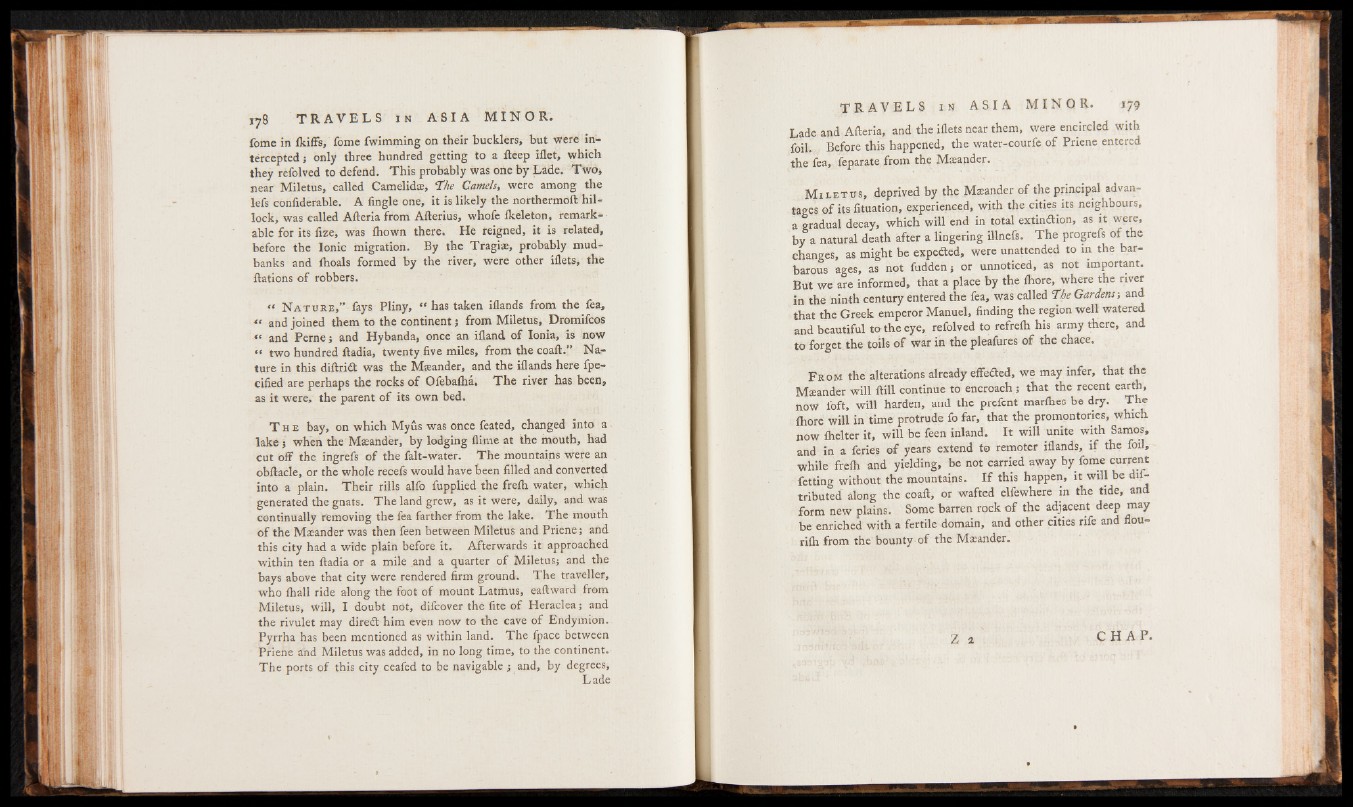
I l
1 1
1 1 '
178 T R A V E L S in AS IA MINOR.
fome in fluffs, fome fwimming on their bucklers, but were intercepted
j only three hundred getting to a fteep iflet, which
they refolved to defend. This probably was one by Lade. Two,
near Miletus, called Camelids, The Camels, were among the
lefs confiderable. A Angle one, it is likely the northermoft hillock,
was called Afteria from Afterius, whofe Ikeleton, remarkable
for its flze, was Ihown there. He reigned, it is related,
before the Ionic migration. By the Tragi®, probably mud-
banks and flioals formed by the river, were other iflets, the
ftations of robbers.
“ N a t u r e ,” fays Pliny, p has taken iflands from the fea,
« and joined them to the continent 5 from Miletus, Dromifcos
“ and Perne; and Hybanda, once an iiland of Ionia, is now
<* two hundred fladia, twenty flve miles, from the coaft.” Nature
in this diftridt was the M®ander, and the iflands here fpe-
cified are perhaps the rocks of Ofebalha. The river has been,
_ as it were, the parent of its own bed.
T he bay, on which Myus was once feated, changed into a
lake? when the M®ander, by lodging flime at the mouth, had
cut off the ingrefs of the falt-water. The mountains were an
obftacle, or the whole recefs would have been Ailed and converted
into a plain. Their rills alfo fupplied the frefh water, which
generated the gnats. The land grew, as it were, daily, and was
continually removing the fea farther from the lake. The mouth
of the M®ander was then feen between Miletus and Prienej and
this city had a wide plain before it. Afterwards it approached
within ten fladia or a mile and a quarter of Miletus; and the
bays above that city were rendered Arm ground. The traveller,
who (hall ride along the foot of mount Latmus, eaftward from
Miletus, will, I doubt not, difcover the Ate of Heraclea; and
the rivulet may diredt him even now to the cave of Endymion.
Pyrrha has been mentioned as within land. The fpace between
Priene and Miletus was added, in no long time, to the continent.
The ports of this city ceafed to be navigable ; and, by degrees,
Lade
T R A V E L S i n A S I A MI N O R . 179
Lade and Afteria, and the iflets near them, were encircled with
foil. Before this happened, the water-courfe of Priene entered
the fea, feparate from the Mæander.
M i l e t u s , deprived by the Mæander of the principal advantages
of its fltuation, experienced, with the cities^ its neighbours,
a gradual decay, which will end in total extindlion, as it were,
by a natural death after a lingering illnefs. The progrefs of the
changes, as might be expected, were unattended to in the barbarous
ages, as not fuddenj or unnoticed, as not important.
But we are informed, that a place by the fliore, where the river
in the ninth century entered the fea, was called The Gardens-, and
that the Greek emperor Manuel, ftnding the region well watered
and beautiful to the eye, refolved to refrefti his army there, and
to forget the toils of war in the pleafures of the chace.
F rom the alterations already effedted, we may infer, that the
Mæander will ftill continue to encroach ; that the recent earth,
now foft, will harden, and the prefent marlbes be dry. The
fliore will in time protrude fo far, that the promontories, which
now flielter it, will be feen inland. It will unite with Samos,
and in a feries of years extend to remoter iflands, if the foil,
while frefti and yielding, be not carried away by fome current
fetting without the mountains. I f this happen, it will be dif-
tributed along the coaft, or wafted elfewhere in the tide, and
form new plains. Some barren rock of the adjacent deep may
be enriched with a fertile domain, and other cities rife and flou-
rifti from the bounty of the Mæander.
Z 2 CHAP.